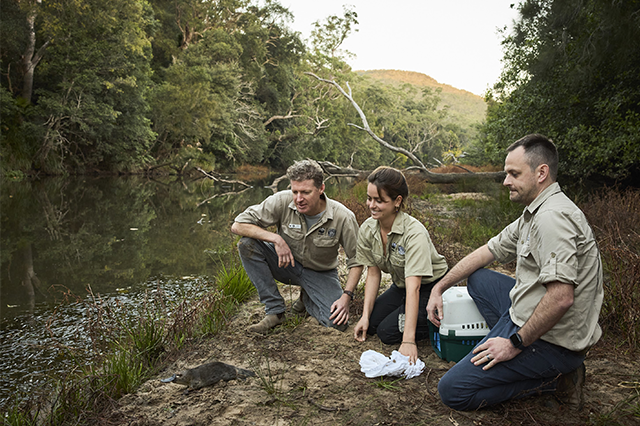Protecting Australia's natural environment has long been a cause held dear at Allens, so when opportunities came up to lend a hand on two cutting-edge environmental initiatives, there was no shortage of volunteers.
Through advising startups as part of an environmental innovation challenge and participating in AI image tagging to save one of Australia's most iconic species, Allens has continued its close relationship with pro bono client and matched funding partner, WWF-Australia.
For the first project, Allens was approached by WWF with a call for volunteers to assist with image tagging for a project to reintroduce the platypus to Sydney's Royal National Park.
Volunteers were asked to review photos taken in the Royal National Park by camera traps and analysed by AI, identifying the species and number of animals in order to better understand the ecology of the park and how it may affect the reintroduced platypus.

© WWF-Aus / R Freeman
'Camera trapping is a very important tool used in conservation that allows us to gain an insight into the species diversity and activity in an area, whilst causing minimal disruption to the wildlife,' said Fran Roncolato, WWF-Australia's Rewilding Program Coordinator.
'This has been vital in the Royal National Park, informing key management decisions leading up to the reintroduction of the platypus earlier this year. WWF-Australia loved engaging with the passionate team at Allens as they powered through cataloguing thousands of photos for this project in under an hour.'
Forty Allens volunteers tagged more than 2000 images in 45 minutes, spotting swamp wallabies, superb lyrebirds, ringtail possums, red foxes and Javan deer in the process.
'Volunteering at the WWF event was a wonderful opportunity to peek into the lives of animals in the Royal National Park, hear thoughtful insights from conservation ecologists and contribute to the important rewilding efforts of endangered species. It was also a great way of immersing myself in nature from the comfort of the office,' said Lawyer Gabby Ong, who volunteered for the image tagging project.
'It was rewarding to be able to contribute to such a worthy project, and I think we all enjoyed the challenge of identifying the animals. It was strangely familiar, a bit like document review – but instead of documents, I was tagging photos of a superb lyrebird exploring a section of the park,' added fellow volunteer Sarah Muller, an Associate in Intellectual Property and PTA.
The second initiative saw Allens present a legal workshop for startups participating in the Innovate to Regenerate challenge.
The Innovate to Regenerate challenge is designed to uncover innovative solutions to reverse environmental damage and create a positive impact for people and the planet. It particularly seeks to support regenerative, community-led solutions that encourage impact investment in priority areas like food, biodiversity and climate.
Allens' workshop was designed to help participating startups establish strong legal foundations, and covered topics such as protecting IP rights, preparing and negotiating contracts, corporate structures (with a focus on community-based structures), and legal considerations around fundraising.
'It was very rewarding to be able to make a positive difference in assisting these important organisations avoid legal potholes that often trip up not-for-profit organisations at their early stages,' said Lawyer Art Honeysett, who ran the workshop alongside Managing Associate Dominic Anderson and Senior Associate Madeleine Hunt.





